2016年仁爱英语九年级Unit_4_topic_2_重点知识点
- 格式:doc
- 大小:82.50 KB
- 文档页数:7


Unit 4 Fantastic Science Topic 2知识点汇编重点词汇:1. be used for +ving 被用做……2. come true 实现3. It’s said that 据说4. during/in one’s life 某人一生5. be known as 以……(身份)而著名6. know/say for certain 确切知道/肯定地说7. all the time 一直、总是8. no longer=not…any longer 不再(no more, not…any more)9. as long as 只要10. as far as 就……,尽……11. make a great contribution 对……作出巨大贡献12. the rest of the time 在其余地时间里13. at any time 在任何时候一、重点句型:1. Because I’m not allowed to play computer games.因为我不可以玩电脑游戏。
allow “允许、准许”的意思。
常用于以下几种形式:(1) allow +n./prep 如:We can’t allow such a thing.我们不容许这种事情发生。
(2) allow sb. to do sth 允许某人做某事如:She allowed me to go fishing.她允许我去钓鱼。
(3) allow +doing sth 允许做某事如:We don’t allow smoking in the reading-room.我们不允许在阅览室吸烟。
(4) be allowed to do sth如:被允许做某事The students are allowed to play games on the play ground after school.放学后学生们被准许在操场上做游戏。
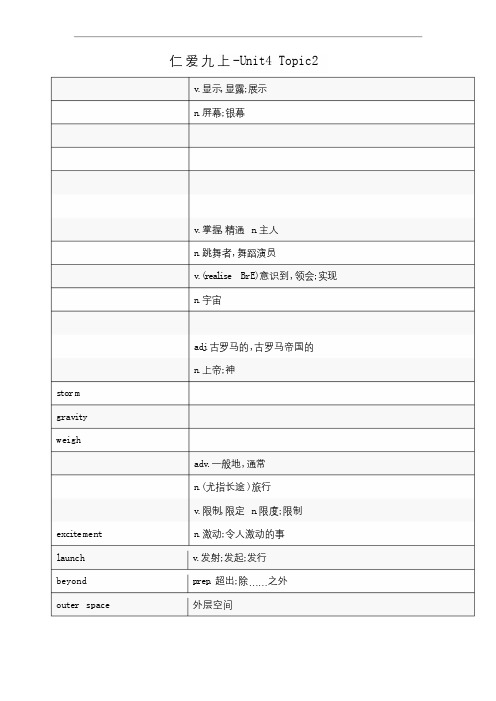
仁 爱 九 上 -Unit4 Topic2v .显示,显露;展示n .屏幕;银幕v .掌握,精通 n .主人n .跳舞者 ,舞蹈演员v .(rea l i se BrE)意识到 ,领会;实现n .宇宙ad j .古罗马的 ,古罗马帝国的n .上帝;神s tor mgravi tyweighadv .一般地 ,通常n .(尤指长途 )旅行v .限制,限定 n .限度;限制n .激动;令人激动的事 v .发射;发起;发行 prep . 超出;除……之外 外层空间exc i tementlaunchbeyondouter spacedia meter n.直径重点短语:1. l ive on Mars居住在火星上2. l ive in space居住在太空3.on the ea r th在地球上4.can’t wait to do sth. 迫不及待做某事5.be ab le to能够6. t ake par t in/j oin in参加(活动)7.admire sb.for(do ing)s th.因为(做)某事羡慕某人8.g row up成长,长大9.mas te r some bas ic compute r s ki l l s掌握一些基本的电脑技能10.per form ba l le t表演芭蕾11.pre fe r do ing s th.to do ing s th.比起做某事更喜欢做某事12.know l i t t l e about几乎不了解13.by chance偶然14.be named a f t er以……命名15.倍数/分数/百分数+ as…as… 相当于……几倍/几分之几/百分之……16.go/t rave l/c i rcl e a round围绕……旋转17.at a distance of… 相距……18.be covered by/wi th被……覆盖19.I t t akes sb.some t ime to do s t h.花费某人多少时间做某事20.be c lose to与……靠近,紧挨着21.search fo r s th.搜寻某物search sp.fo r s th.某地搜寻某物22.I t i s +时间段+s ince从句I t has been +时间段+s ince从句时间段+ has passed +s ince从句23.in genera l/genera l ly speak ing/genera l ly总的来说24.go wel l进展顺利25.what’s worse 糟糕的26.the use of ……的用途27.another +数词+名词复数=数词+more+名词复数another t wo days =two m ore days28.be wor th do i ng s th.值得做某事29.wish sb.luck祝某人好运30.there have/has been…有……(there be 句型现在完成时结构)31.ou ter space外层空间32.一般将来时被动语态:wi l l be +p.p词形转换:1.we igh v.重,有……重we igh t n.重量2.exc i t e v.激动,使(人)兴奋exc i ted ad j.激动的,兴奋的exc i t ing ad j.令人激动的exc i tement n.激动,令人激动的事3.d i scover v.发现discovery n.发现4.d ry v.使……干燥ad j.干燥的v.供应5.supp ly n.[U]供应;[C]供应品6.wor th p rep.值…… n.价值wor thy ad j.有价值的wor th less ad j.无价值的重点句型:1. A wonder fu l m ovie wi l l be shown ton igh t.一场精彩的电影今天晚上将被上映。
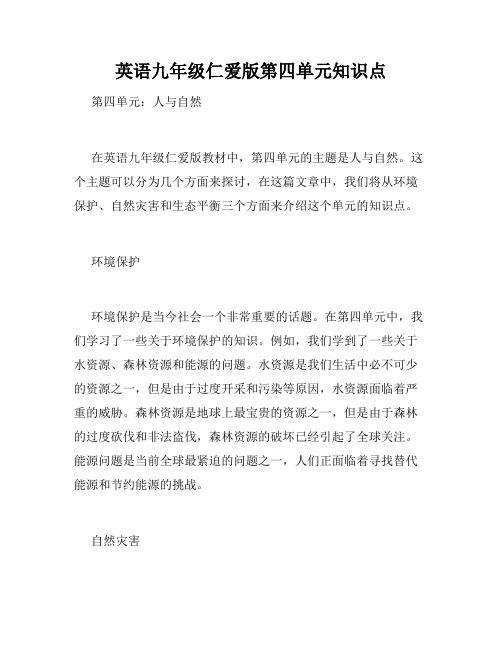
英语九年级仁爱版第四单元知识点第四单元:人与自然在英语九年级仁爱版教材中,第四单元的主题是人与自然。
这个主题可以分为几个方面来探讨,在这篇文章中,我们将从环境保护、自然灾害和生态平衡三个方面来介绍这个单元的知识点。
环境保护环境保护是当今社会一个非常重要的话题。
在第四单元中,我们学习了一些关于环境保护的知识。
例如,我们学到了一些关于水资源、森林资源和能源的问题。
水资源是我们生活中必不可少的资源之一,但是由于过度开采和污染等原因,水资源面临着严重的威胁。
森林资源是地球上最宝贵的资源之一,但是由于森林的过度砍伐和非法盗伐,森林资源的破坏已经引起了全球关注。
能源问题是当前全球最紧迫的问题之一,人们正面临着寻找替代能源和节约能源的挑战。
自然灾害自然灾害是人与自然之间的不可抵挡的力量。
在第四单元中,我们学习了一些关于自然灾害的知识。
例如,我们了解了地震、洪水、干旱和台风等自然灾害的形成原因和对人类生活的影响。
地震是由于地壳运动引起的,可以造成建筑物倒塌、人员伤亡等严重后果。
洪水是由于降雨过多或河流水位上涨引起的,会造成农田被淹、房屋被冲毁等严重的损失。
干旱是指长时间内降雨量不足引起的,会导致农作物减产、水资源短缺等问题。
台风是热带气旋的一种形式,会造成强风、巨浪和暴雨,对沿海地区的人们造成巨大的威胁。
生态平衡生态平衡是指自然界各种生物和环境之间的稳定关系。
在第四单元中,我们学习了一些关于生态平衡的知识。
例如,我们了解了食物链和食物网的概念。
食物链是描述生物之间食物关系的方式,包括了食物链中的捕食者和被捕食者。
食物网则是由多个食物链组成的复杂网络,揭示了不同物种之间错综复杂的关系。
我们还学习了一些关于保护生物多样性的方法,如建立自然保护区、禁止乱砍滥伐等。
总结通过学习第四单元的知识,我们更加了解了人与自然之间的关系。
保护环境、预防自然灾害和维护生态平衡是我们每个人的责任。
只有我们共同努力,才能创造一个更加美丽和可持续发展的世界。

仁爱版英语九年级上册Unit2-Unit4知识点归纳U2 Topic 2I. 重点词组1. as a result 结果2. here and there 到处3. in the beginning 一开始4. in danger 处于危险中5. cut down 砍倒6. change sth. into sth. 把……变成……7. prevent from 防止8. greenhouse effect 温室效应9. refer to 提到10.deal with 处理11.take up 占据12.cut off 中断II. 重点句型1. As we know, none of us likes pollution. 众所周知,没有人喜欢污染。
none与no one 的区别:a)none “全无”,既可指人也可指物,后常跟of 的短语; 作主语时,谓语动词既可用单数也可用复数;no one只指人,后不能跟of 的短语; 作主语时,谓语动词只用作单数。
如:He has read none of these books.(指物)这些书他一本都没看过。
None of my friends like/ likes drawing.(指人)我的朋友们没有一个喜欢画画。
No one is here.没有一个在这儿。
b)none回答how many/ much的问题;no one回答who的问题。
如:A: How many students come to school by taxi? B: None.有多少的学生搭出租车来上学?没有人。
A: How much water is there in the bottle? B: None.瓶子里有多少水?一点儿也没有。
A: Who is in the room? B: No one.谁在房中?没有人。
2、Trees can also stop the wind blowing the earth away.树木也能防风固土。

Unit 4 Topic 2短语一、重点词汇:be allowed to do sth 被允许 allow sb to do sth 允许某人做某事 allow doing sth 允许做某事be bad for ...对......有害的 show sb. sth.=show sth. to sb. 给某人出示某物花费时间 / 金钱在(做)某事上 ( sb. spend 时间 / 金钱 on sth. / in doing sth. sb.pay 钱. for sth. ; It takes / took sb. 时间 /金钱 to do sth.; sth. cost sb.钱 )be made of由.....制成(看得出原材料) be made from 由.....制成(看不出原材料)be used for doing sth.= beused to do sth.被用来做某事 some day 某一天come true 实现 hope to do sth 希望做某事 wish sb to do sth 希望做某事in the past在过去 in one's daily life 在某人日常的生活中It is said/reported that... 据说/报道 during/in one's life 在某人的一生中go this way 走这条路 be different from 与.....不同know about了解 throughout the world=all over the world= around the world遍及全世界so far到目前为止 with one's help= with the help of 在某人的帮助下be similar to 与……相近 treat……as = regard ……as 把……看做……make laws 制订法律 for certain 确定work for 受雇于,为……工作 all the time 一直be surprised at sth... 对.....感到吃惊to one’s surprise 令人惊讶的是in a few years 过几年 think for oneself 自己独立思考warn sb of/about sth 警告某人注意某事 warn sb not to do sth 警告某人不要作某事 warn sb against (doing) sth 告诫某人远离(做)某事 warn + that 从句no longer=not…any longer 不再(no more, not…any more) be meant to do sth 应该做某事 in the field 在……领域make a contribution to(doing)sth 为……做贡献 in……direction 朝……方向work well in doing sth 在……效果好 as long as 只要at any time 在任何时候in short 总之run away 跑开take photos 照相 have an effect/effects on 对……产生影响the rest of 剩余的 find out 找出get lost=be lost= lose one's way 迷路 in the sky 在天空里二、重点句型:1. Because I’m not allowed to play computer games. 因为我不可以玩电脑游戏。

Unit 4 Topic1 When was it invented?Ⅰ.词组归纳:be(not) allowed to do sth. (没有)被允许做某事show sth. to sb.=show sb. sth. 把某物展示给某人看①be made by sb. 被……(某人)制作②be made of 用……制造的(可看出原材料)③be made from 用……制造的(不可看出原材料)④be made in 在…….(地点)制造⑤be made into 被制成…….send sth. to sp. 、sb. 发送某物给某人\某地realize…=make … come true 实现…spend sometime/some money (in)doing sth. 花费时间\金钱做某事spend sometime/some money on sth. 在。
上花费时间\金钱some knowledge about sth. 一些关于…….的知识8.①be used to do sth =be used for doing sth. 被用做某事②be/get used to doing sth. 习惯于做某事used to do sth. 过去常常做某事③be used as…某物被用作……./被作为。
使用9.It is said that…据说……10.during one’s life 在某人的一生中11.go this way 走这边12.make tents 搭帐篷e about 产生15.a few simple steps 一点简单的步骤16.be discouraged by 被……阻挡17.brainstorm for ideas 集思广益18.make a detailed drawing 画下具体的图画19.share sth. with sb. 和某人分享某物21.the rest of the time 剩余的时间22.a man-made satellite 一颗人造卫星23.the shape of the earth 地球的形状Ⅱ重点句子:1.The radio was invented by Guglielmo Marconi in 1895. 收音机是在 1895 年马可尼发明的.2.When was the digital camera developed? 数码相机是什么时候研发的?It was developed in the 1970s. 它发展于 20 世纪 70 年代.3.Where was it developed? 它在哪发展的?It was developed in Japan. 它在日本得以发展.4.What is a rocket used for? 火箭被用来做什么?It is used for sending satellites or spaceships into space.它被用作发射卫星或宇宙飞船到太空.5.I wish I could go into space some day. 我希望有一天我能去太空.6.I hope your dream will come true. 我希望你梦想成真.7.It’s said that he invented more than two thousand things during his life.据说他一生中发明了两千多项东西.8.Inventing is interesting and exciting and everyone can be an inventor.发明是有趣且激动人心的,每个人都能成为发明家.Ⅲ. 语法 (被动语态)①构成法:1.一般现在时的被动语态构成:is / am / are + 及物动词的过去分词Our classroom is cleaned every day.2.一般过去时的被动语态构成:was / were + 及物动词的过去分词A new shop was built last year.3.现在完成时的被动语态构成:has / have + been +及物动词的过去分词Many man-made satellites have been sent up into space by many countries.4.一般将来时的被动语态构成:will/shall+ be + 及物动词的过去分词A new hospital will be built in our city.5.含有情态动词的被动语态构成:情态动词+ be + 及物动词的过去分词Young trees must be watered often.6.现在进行时的被动语态构成:am / is / are + being +及物动词的过去分词Eg : They are planting trees over there. →Trees are being planted over there bythem.7.不定式的被动语态:to + be + 及物动词的过去分词There are two books to be read. →There are twenty more trees to be planted.②注意事项:不及物动词无被动语态.2.感官动词或使役动词使用省略 to 的动词不定式,主动语态中不带 to ,但变为被动语态时,须加上 to 。
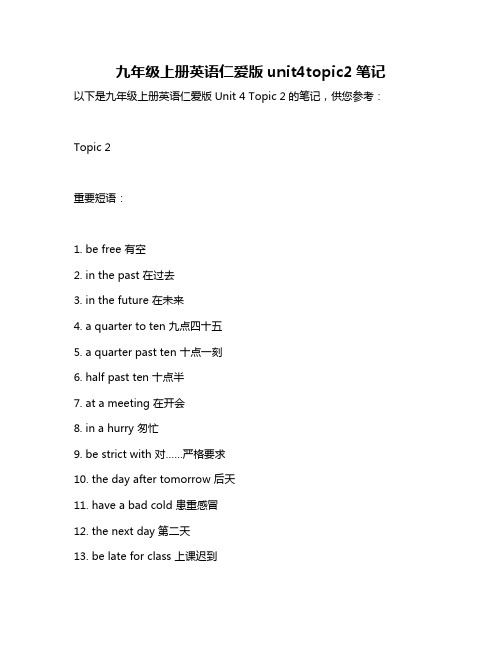
九年级上册英语仁爱版unit4topic2笔记以下是九年级上册英语仁爱版Unit 4 Topic 2的笔记,供您参考:Topic 2重要短语:1. be free 有空2. in the past 在过去3. in the future 在未来4. a quarter to ten 九点四十五5. a quarter past ten 十点一刻6. half past ten 十点半7. at a meeting 在开会8. in a hurry 匆忙9. be strict with 对……严格要求10. the day after tomorrow 后天11. have a bad cold 患重感冒12. the next day 第二天13. be late for class 上课迟到14. as soon as 一……就……15. in time 及时16. look forward to 盼望17. be on 在上演,上映18. stay healthy 保持健康19. catch up with 赶上20. keep healthy 保持健康21. all the time 一直,始终22. be popular with 受……欢迎23. at the moment 现在,此刻24. be sure about 对……有把握25. make sure 确信,确保26. the first/second/third time 第一次/第二次/第三次……27. the + 比较级,the + 比较级表示“越……越……”28. that’s why… 那是因为……29. would rather do sth than do sth else 宁愿做某事而不愿做另一件事 doing sth to doing sth else 更喜欢做某事而不是做另一件事+序数词,表示“第几……”one’s +序数词+生日,表示“在某人的第几个生日”one’s +整十基数词的复数形式,表示“在某人几十多岁的时候”the +节日的英文名称,表示“在某个节日”then on 从那时起/get ready for sth 为某事做准备/get excited about sth 对某事感到兴奋、激动。
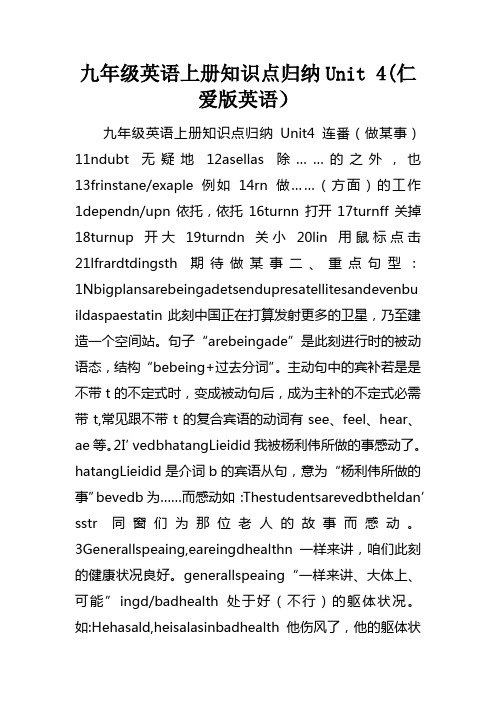
九年级英语上册知识点归纳Unit 4(仁爱版英语)九年级英语上册知识点归纳Unit4连番(做某事)11ndubt无疑地12asellas除……的之外,也13frinstane/exaple例如14rn做……(方面)的工作1dependn/upn依托,依托16turnn打开17turnff关掉18turnup开大19turndn关小20lin用鼠标点击21lfrardtdingsth期待做某事二、重点句型:1Nbigplansarebeingadetsendupresatellitesandevenbu ildaspaestatin此刻中国正在打算发射更多的卫星,乃至建造一个空间站。
句子“arebeingade”是此刻进行时的被动语态,结构“bebeing+过去分词”。
主动句中的宾补若是是不带t的不定式时,变成被动句后,成为主补的不定式必需带t,常见跟不带t的复合宾语的动词有see、feel、hear、ae等。
2I’vedbhatangLieidid我被杨利伟所做的事感动了。
hatangLieidid是介词b的宾语从句,意为“杨利伟所做的事”bevedb为……而感动如:Thestudentsarevedbtheldan’sstr同窗们为那位老人的故事而感动。
3Generallspeaing,eareingdhealthn一样来讲,咱们此刻的健康状况良好。
generallspeaing“一样来讲、大体上、可能”ingd/badhealth处于好(不行)的躯体状况。
如:Hehasald,heisalasinbadhealth他伤风了,他的躯体状况老是不行。
4euldn’thelplingattheearthagainandagain 咱们忍不住再三地看着地球。
an’t/uldn’thelpdingsth 忍不住做某事,不能停止做某事。
如:Ian’thelpring我忍不住哭了。
againandagain一再,多次,如:Theteaherhastldhiagainandagain教师已多次和他讲过了。

仁爱九年级上册Unit4知识点回顾与拓展Unit4是仁爱九年级上册中的一个重要单元,主要涉及了英语学习中的一些基础知识点和语法结构。
在这篇文章中,我们将会对这些知识点进行回顾和拓展,为同学们复习和巩固这些重要内容提供帮助。
一、单词与短语在Unit4中,我们学习了一些重要的单词与短语,如"exciting"(令人兴奋的)、"fascinating"(迷人的)、"curious"(好奇的)等,这些词汇可以用来描述人或事物,增强我们的表达能力。
此外,我们还学习了一些有关旅行与交通的词汇,比如"ticket"(票)、"station"(车站)、"flight"(航班)等。
这些词汇对于我们日常生活和旅行中的交流非常重要,掌握它们能够帮助我们更好地理解和应用英语。
二、语法知识在Unit4中,我们学习了一些重要的语法知识,如祈使句、感叹句和特殊疑问句等。
1. 祈使句祈使句是表示命令、请求、建议等的句子,常用的形式是动词原形加上句号。
例如:"Open the window."(打开窗户)"Please be quiet."(请安静)2. 感叹句感叹句用于表达惊讶、赞美、悲伤等强烈情感。
一般情况下,感叹句由"What"、"How"、"What a"等开头。
例如:"What a beautiful view!"(多美的景色啊!)"How clever she is!"(她多聪明啊!)3. 特殊疑问句特殊疑问句用于询问特定信息,在句首使用特殊疑问词,如"What"、"Where"、"When"、"Why"、"How"等。
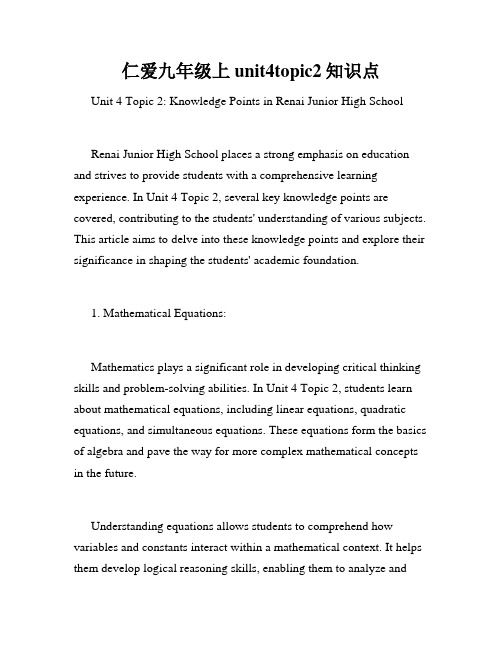
仁爱九年级上unit4topic2知识点Unit 4 Topic 2: Knowledge Points in Renai Junior High SchoolRenai Junior High School places a strong emphasis on education and strives to provide students with a comprehensive learning experience. In Unit 4 Topic 2, several key knowledge points are covered, contributing to the students' understanding of various subjects. This article aims to delve into these knowledge points and explore their significance in shaping the students' academic foundation.1. Mathematical Equations:Mathematics plays a significant role in developing critical thinking skills and problem-solving abilities. In Unit 4 Topic 2, students learn about mathematical equations, including linear equations, quadratic equations, and simultaneous equations. These equations form the basics of algebra and pave the way for more complex mathematical concepts in the future.Understanding equations allows students to comprehend how variables and constants interact within a mathematical context. It helps them develop logical reasoning skills, enabling them to analyze andsolve problems effectively. Additionally, equations provide a framework for expressing real-life situations mathematically, enhancing students' ability to model and interpret various scenarios.2. The Periodic Table:In the field of science, chemistry is fundamental in understanding the composition, structure, properties, and changes of matter. The periodic table is a crucial tool for organizing and representing different elements based on their atomic structure and properties. Unit 4 Topic 2 introduces students to the periodic table, allowing them to comprehend the principles behind this essential tool.Through the periodic table, students gain knowledge about the various elements, such as their atomic numbers, atomic masses, electronegativity, and chemical reactivity. This knowledge forms the foundation for further exploration of chemical reactions, bonding, and the behavior of elements in different states. Understanding the periodic table equips students with the ability to analyze and predict the behavior of elements and compounds, facilitating their comprehension of the natural world.3. Grammar: Verb Tenses and Voice:Language is a powerful tool for communication, and a strong command of grammar is essential for effective expression. In Unit 4 Topic 2, students delve into the study of verb tenses and voice in English grammar.Verb tenses enable students to express actions or states occurring in different time frames. It helps convey accurate information about the past, present, and future. Understanding verb tenses enhances students' ability to construct coherent and fluent sentences, contributing to their overall language proficiency.In addition, the concept of voice in grammar, including active voice and passive voice, plays a crucial role in sentence construction and conveying the appropriate level of formality in communication. By grasping the concept of voice, students can effectively adapt their writing and speaking styles to various contexts, further enhancing their language skills.4. Environmental Awareness:Unit 4 Topic 2 also emphasizes the importance of environmental awareness. Students are encouraged to develop an understanding ofenvironmental issues, such as pollution, habitat destruction, and climate change. By studying these topics, students become aware of the impact of human activities on the environment and are equipped with the knowledge to make informed decisions and take action towards a more sustainable future.Through discussions, group activities, and research, students learn about the importance of conservation, alternative energy sources, and the significance of responsible consumption. Environmental awareness fosters a sense of compassion and responsibility towards the planet, empowering students to actively contribute to a healthier and greener society.In conclusion, Unit 4 Topic 2 in Renai Junior High School encompasses various knowledge points across different subjects. It covers mathematical equations, the periodic table, grammar concepts, and environmental awareness. These knowledge points are invaluable in shaping the students' academic foundation, nurturing critical thinking skills, facilitating effective communication, and fostering a sense of responsibility towards the environment. Renai Junior High School strives to provide its students with a holistic education that equips them with the skills and knowledge necessary for success in the future.。

仁爱版九年级上册u4t2知识点九年级上册一共有四个单元,每个单元都有不同的主题和知识点。
在第四个单元中,我们将重点讨论范围广泛的知识点。
本文将围绕这个主题展开,深入了解仁爱版九年级上册第四单元中的知识点。
首先,让我们来了解一下这个单元的主题是什么。
这个单元的主题是“知识点”,通过学习这些知识点,我们可以更好地理解和掌握相关的知识。
在这个单元中,我们将学习一些关于地理、历史、文化、科学等方面的知识点。
第一个待讨论的知识点是地理知识。
在这个单元中,我们将深入探讨世界地理的相关知识。
首先是世界的分区,包括亚洲、非洲、欧洲、北美洲、南美洲、大洋洲和南极洲。
这些分区代表着不同地区的地理特点和文化特点。
我们将了解每个地区的地理位置、气候、人口和资源分布等方面的相关知识。
接下来,我们将进入历史知识的领域。
我们将学习一些关于古代文明和重要历史事件的知识。
比如,我们将了解古埃及文明的发展和特点,古罗马帝国的兴衰,以及中国历史上的一些重要事件和人物。
通过学习这些知识,我们可以更好地理解人类文明的历史发展和重要影响。
此外,在这个单元中,我们还将学习一些关于科学方面的知识点。
比如物质的性质和变化、能源的利用和环保等。
通过学习这些知识,我们可以更好地理解科学的基本原理和应用,以及科学对我们生活的影响。
最后,我们将进入文化知识的领域。
在这个单元中,我们将学习一些关于不同文化的知识。
比如,我们将了解一些国家的传统文化、重要节日和习俗,以及各种艺术形式的发展和特点。
通过学习这些知识,我们可以更好地了解和尊重不同文化之间的差异和共同点。
通过本文对仁爱版九年级上册第四单元中的知识点的介绍,我们可以看到这个单元的内容非常丰富多样。
通过学习这些知识点,我们可以拓宽自己的视野,增长自己的知识,提高自己的综合素质。
希望大家能够充分利用这个单元的学习机会,为自己的未来铺建坚实的知识基础。

仁爱版九年级unit4知识点【Unit 4 知识点】仁爱版九年级英语课本的Unit 4主要涵盖了以下几个知识点:dreaming of/about, writing about personal experiences, phrases and structures, using"bite"and"bleed"correctly, etc. 本文将从这些知识点出发,为你进行详细讲解。
一、dreaming of/about在Unit 4中,有一部分内容是关于“梦想”的。
我们可以用dream of/about来表达这个意思。
例如,“He dreams of becoming a famous writer one day.”这句话中的dream of就是表示梦想的意思。
而dream about也是表示梦想的含义,它们可以互换使用,只是在句子中的位置略有不同。
二、writing about personal experiences在Unit 4的课本中,有一篇关于个人经历的文章。
这种写作形式是一种常见的写作方式,也是提高写作水平的重要手段。
在写作个人经历时,我们可以使用一些词语和句子来描述和表达。
例如,“On that unforgettable day…”,“When I look back on thatexperience…”等等。
这些句子可以帮助我们更生动地描述我们的个人经历。
三、phrases and structuresUnit 4中还有一些重点短语和句型结构需要掌握。
比如,"In those days..." (在那些日子里…),"What's more..." (而且…),"It was at that moment that..." (就在那一刻…)等等。
这些短语和句型结构能够使我们的写作更加丰富多样,增添一定的复杂度。

Unit4 Topic2 课文重难点讲解【1】We will be able to do anything that can be done on the earth. 我们可以做在地球上能做的任何事情。
(1) that can be done on the earth 定语从句修饰anything。
如:We’ll raise money for the children who live in the poor areas.(定语从句修饰children)我们将为那些生活在贫困地方的孩子筹集资金。
The car which (that) I hired broke down. (定语从句修饰car)我租的汽车坏了。
(2)从句的谓语用的是带有情态动词的被动语态,构成的形式为“情态动词+be +及物动词的过去分词”。
如:These trees must be planted tomorrow. 这些树必须在明天栽种。
More satellites will be sent into space. 更多的人造卫星将会被发射进人太空。
【2】One American scientist thinks they have already come to the earth, and they are reading information on the Internet in order to learn about human culture. 一位美国科学家认为他们已经来过地球,并且正在互联网上阅读信息,以便学习人类的文化。
in order to…意为“为了......”,表示目的,后接动词原形,相当于so as to。
in order to既可放在句首又可放在句中,so as to只能放在句中,不可放在句首。
它们的否定形式都是在to前加not,即in order not to, so as not to,它们后面只能接动词原形,如果需接目的状语从句可用in order that或so that。
Unit 4 Amazing ScienceTopic 2 I’m excited about the things that will be discovered in the future. 一.重要句型:Section A1. A wonderful movie will be shown tonight.一场精彩的电影将在今晚上映。
Houses, schools and hospitals will be built on Mars .房屋、学校、医院都将被建在火星上。
两句划线部分均为将来时态的被动结构。
将来时态的被动结构为:will / be going to + be v.ed练一练:a).Don’t worry. You ___plenty of time to work it out.A.will giveB.have givenC.will be givenD.are givenb).We are glad a famous writer___ to our school to give a talk next week.A.InvitesB.invitedC.will be invitedD.was invited2. And they can visit planets like Mars. 他们还能访问像火星一样的星球。
like 与as 的用法区别:A.like 说明相似关系,即两者在形态、性质上的相似,但不等同。
He has done a lot of good things like Lei Feng. 他像雷锋那样做了很多好事。
B. as 说明同一关系,指身份,意为“作为,当作”。
Don’t treat me as a child. I’m 15. 别把我当小孩子,我已经十五岁了。
C. as 还有“像,按照”的意思。
Please do it as I do as I tell you. 请照我的吩咐去做。
3. We will be able to do anything that can be done on the earth.我们将能在地球上能做的任何事。
(1)be able to+动词原形意为“能,会”,常用于一般现在时、过去时、将来时和完成时时态。
它的同义词是can,但它仅有一般现在时和过去时态。
在shall,will, have 后面,要用be able to。
He is able to cook. = He can cook. 他会煮饭。
练一练:Everyone _____ read many English articles so far.A.canB.haveC.was able toD.has been able to(2)that can be done on the earth 定语从句修饰anything。
从句的谓语动词的是带有情态动词的被动语态,构成形式“情态动词+be+及物动词的过去分词”。
Trees can be planted in spring.树可以在春季栽种。
4.What fun! 多么有趣啊!这里的fun 为不可数名词,意为“有趣的事”。
类似的感叹句:What a pity! = What a shame! 多么遗憾啊!5. they are reading information on the internet in order to learn about human culture.in order to ...... 意为“为了……”,表示目的,后接动词原形,相当于so as to。
in order to 即可放在句首也可放在句中;so as to 只能放在句中,不能放在句首。
它们的否定形式都是在to 前加not, 即in order not to , so as not to。
In order not to fail the exam,he studied for fourteen hours everyday. 为了考试不失利,他每天学习14小时。
She went to England last year in order that / so that she could learn standard English. 她去年去了英国,为的是学习标准的英语。
6.But I don’t think aliens will be found in space. 但是我认为在太空中找不到外星人。
(1)当think, believe, suppose, imagine, expect 等动词后接的宾语从句含有not 等否定词,且主语为第一人称时,该否定应移至主句,即否定主句的谓语动词。
I don't think it will rain tomorrow. 我认为明天不会下雨。
(2)当主句的主语是第二、三人称时,否定式一般不转移。
He supposes they won’t win the game. 他猜想他们赢不了比赛。
(3)改写成反意疑问句时,当主句的主语为第一人称时,反义疑问句的主、谓与从句一致。
I don’t think it will rain tomorrow,will it? 我认为明天不会下雨,是吗?(4)如果主句的主语是第二、三人称时,反义疑问句的主谓与主语一致。
He thinks he can make it, doesn’t he? 他认为他能办到,是吗?Section B1.They will travel into space and discover something new about Mars. 他们将遨游太空,发现与火星有关的新事物。
A.discover v. 发现(找到原本存在但未被发现的东西);Columbus discovered America in 1492. 哥伦布在1492年发现了美洲。
B.invent v. 发明(发明的对象是以前从未存在的新东西);The inventor invented a lot of things all his life. 这位发明家一生发明了很多东西。
C. find v. 多指偶然发现、碰到,后可接名词、复合结构或that 从句。
强调“找”的结果。
Have you found the book you have been looking for?你找到那本你一直在找的书了吗?D. find out 指通过观察、探索而发现秘密、错误等,后一般接名词或是从句。
Have you found out why he was late? 你弄清他为什么迟到了吗?E. look for 强调“找”的过程。
I’m looking for my watch, but can’t find it.我在找我的手表,但没找到。
2.But I prefer science to dance. 但同跳舞相比,我更喜欢科学。
常用结构:a. prefer sth.to sth. 与某物相比,更喜欢某物;I prefer apples to bananas. 与香蕉相比,我更喜欢苹果。
b. prefer doing sth. to doing sth. 与做某事相比,更喜欢做某事;I prefer playing basketball to swimming. 与游泳相比,我更喜欢打篮球。
c. prefer to do sth. 愿意做;I prefer to go at once.我愿意马上就走。
d. prefer doing sth. 宁愿做某事,更喜欢做某事;I prefer going by bike.我宁愿骑单车去。
e.prefer to do rather than do sth.宁可做……而不做,喜欢做……而不做……He preferred to die rather than (to) steal.他宁死也不去偷窃。
3.I’m excited about the things that will be discovered in the future.我一想到将来可能被发现的东西就很兴奋。
be excited about意为“对……很兴奋”,excited为形容词。
that 是连词,引导定语从句。
练一练:a).We’ll feel____ about a long winter holiday we’ll spend this year.A.pleasedB.interestedC.amazedD.excitedb).I don’t like stories____ have unhappy endings.A.whoB.thatC.whereD.thoseSection C1.Its diameter is 53% as wide as that of the earth.它的直径是地球直径的53%。
The gravity on the surface of Mars is about two-fifths as strong as it is on earth.火星表面的引力大约是地球表面引力的五分之二。
(1)two-fifths as strong as....... 相当……的五分之二强度;two-fifths = two fifths 五分之二。
(2)倍数词/分数/百分数﹢as ﹢形容词或副词原级﹢as......……的几倍/几分之几/百分之几;练一练:We have two ears and one mouth so that we can listen ___ we speak.A.as twice much asB.twice as much asC.as much as twiceD.as much twice as2.Mars goes around the sun at a distance of about 228 million kilometers.火星在相隔大约2亿2千8百万千米的地方绕着太阳旋转。
A. at a distance of 相隔;The moon goes around the earth at a distance of 380000 km. 月球在距地球38万千米的地方绕地球旋转。
B. at a distance 在远处;The police followed him at a distance. 警察远远地跟着他。
3.But during spring and summer, the surface of Mars is covered by strong storms. 但在春、夏两季,火星表面会被强烈的风暴所覆盖。